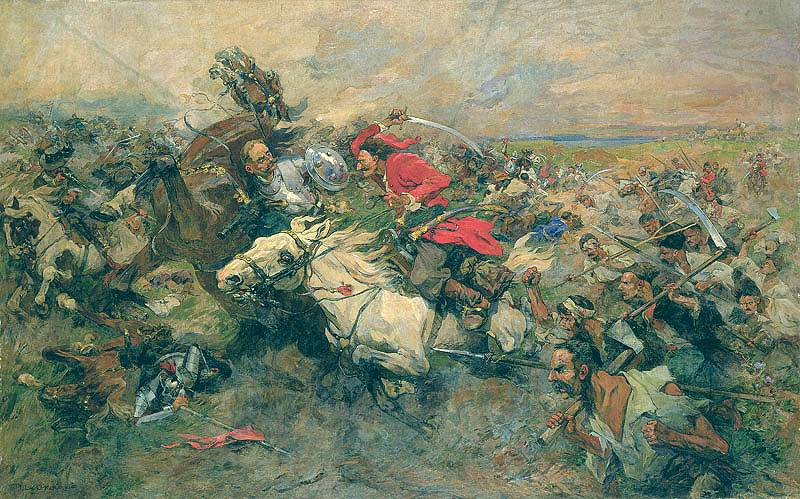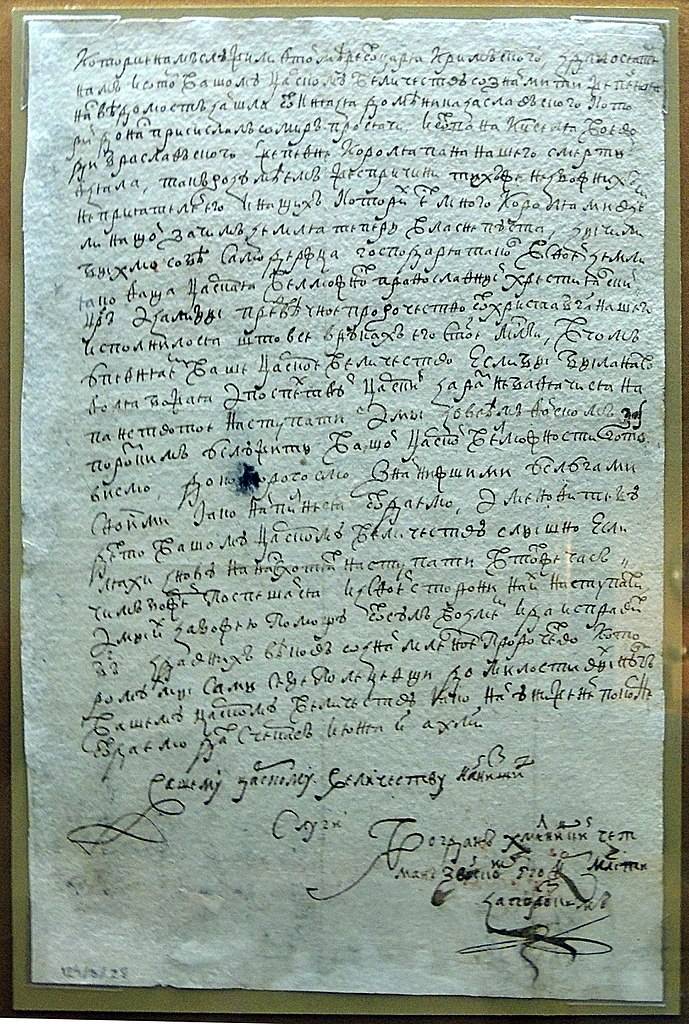"Torment them so that they feel they are dying"

Painting by Nikolai Samokish "Fight of Maxim Krivonos with Jeremiah Vishnevetsky"
Moscow and Khmelnitsky
Moscow immediately learned about the uprising in Little Rus' from the governors of border cities and merchant guests who returned from abroad. They also reported on the desire of the people of the Russian Ukraine to become part of the Russian kingdom. The messengers of the Cossacks also informed about this. The very first Korsun Rada, assembled on May 18, 1648 after the Korsun pogrom of the Polish army (Potocki's army catastrophe near Korsun), made a categorical decision on the reunification of Russian-Little Russians with Russia.
On June 8, 1648, messengers arrived with letters from Khmelnitsky to Tsar Alexei Mikhailovich. They directly raised the question that Little Russia wants to be under the rule of the Russian Tsar, which meant reunification with Russia.
However, the moment was unfortunate. In Moscow, they just suppressed the Salt Riot, caused by increased tax oppression, an increase in indirect taxes (increase in salt prices). In the capital, axes were still clattering, restoring burnt houses. Unrest swept other cities. The tsar had to send his tutor, the influential temporary boyar Morozov, into disgrace. By nature, the quiet and indecisive Tsar Alexei Mikhailovich, who was accustomed to entrusting his affairs to advisers, was confused.
In general, the first Romanovs - Tsar Michael and Alexei were weak. Their long row was settled by temporary workers, strong people who helped undersized kings to rule the country. Under Mikhail, these were the Saltykovs, Prince Repnin, his mother Martha and father Filaret, who was the true ruler of Russia. Under his son Alexei Mikhailovich, the tsar's relatives - the Miloslavskys, the boyar Morozov - occupied a dominant position.
Therefore, Russia moved away from the Time of Troubles for a long time and hard. The Smolensk War was lost to the mighty Commonwealth. A strong army and funds were needed, but the treasury was empty, sources of replenishment were undermined. The nobility wanted to strengthen their rights to land and peasants, to limit the arbitrariness of the boyars and state institutions. The enslavement of the peasants was in full swing. This caused resistance: people fled from the tax collectors, sometimes entire villages went into the forests. They fled beyond the Urals, to the North, to the Don and Yaik, even to the Commonwealth, where it was beneficial for the border gentry to hide such fugitives and even give them benefits for the first time.
Therefore, the uprising of the Cossacks, and then the entire Little Russia in Moscow, was perceived ambivalently. On the one hand, opportunities opened up to take advantage of the weakness of Poland, to return the ancient Russian fatherlands. On the other hand, there was a danger that the uprising would spread to the lands of the Russian kingdom, where there were also many dissatisfied with the policy of the authorities, enslavement. That a great turmoil will break out again. The Polish authorities wrote to the tsar about Khmelnytsky as a "robber", "rebel" and "serf". Border Russian governors wrote that they were afraid of the Little Russian rebels, who enjoyed the sympathy of Russian townspeople and peasants. And in Moscow itself, they still rubbed the blood from the Salt Riot.
As a result, the government of Alexei Mikhailovich did not immediately decide to go to war with the Commonwealth. A war for which they were not preparing, in which the Crimeans, Turks and Swedes could intervene. We decided to wait, arrange affairs within the country. Khmelnitsky was not given an answer. However, the government instructed the border governors to send “knowledgeable secret people” to Little Rus', Lithuania and Poland in order to find out everything for sure and report to the capital. That is, the collection of intelligence information began.

Sheet of Hetman Bohdan Khmelnitsky to Tsar Alexei Mikhailovich with a message about the victories over the Polish troops and the desire of the Zaporizhzhya Cossacks to enter into Russian citizenship. Cherkasy, 1648, June 8
War of the Russian people
Meanwhile, the uprising in the Russian lands of the Kingdom of Poland was expanding and growing. Everywhere the peasants took up pitchforks and axes, beat the gentry and stewards, smashed and burned the estates. Khmelnytsky's army marched on Belaya Tserkov and grew rapidly. A resident of Starodub, Klimov, who returned from the Russian outskirts of Ukraine, reported:
Khmelnytsky's army already numbered more than 50 thousand people. And people kept walking. The hetman arms and organizes the army. Six old registered regiments were understaffed and reorganized - Chigirinsky, Cherkassky, Korsunsky, Kanevsky, Belotserkovsky and Pereyaslavsky. According to their model, new territorial regiments were formed with centers in the cities: on the Left Bank - Prilutsky, Mirgorodsky, Nezhinsky, Bortsensky, Ichnyansky; on the Right Bank - Kiev, Uman, Vinnitsa. In the future, with the development of the liberation war, new regiments were created.
From under the White Church, Khmelnitsky sends out his universals across the Russian land, calling on the people to war against foreign enslavers who want to “conquer us with fire and sword, destroy our dwellings, turn us into dust and ashes, knock us out ourselves, take others into an unmerciful will” .
Pans and gentry fled from the Russian regions, or tried to organize resistance. In the Poltava region, the Russian governor, Prince Jeremiah (Yarema) Vishnevetsky (a Western Russian princely family) gathered a rather large detachment of gentry and armed servants. He dispersed and cut down the "mob", burned the villages, trying to frighten the rebels with terror. His detachments exterminated everyone in the rebellious villages, the path of his troops was littered with gallows and stakes.
Khmelnytsky sent an embassy: he informed the prince that the army of the crown hetman Potocki had been destroyed, demanded that the massacre be stopped and that negotiations be started. The prince put the Cossack ambassadors on a stake. A detachment of Krivonos, the closest associate of Khmelnitsky, came out against the Russian governor. It was a more serious enemy than the peasants. In addition, the villagers joined the Cossacks in droves. Prince Yarema did not dare to give battle and retreated from the Left Bank to the right bank of the Dnieper.
On the Right Bank of the governor, the Russian was also marked by terrible atrocities. The prince announced:
His troops devastated Podolia, Bratslavshchina, leaving behind only ashes and corpses. Nemirov, who raised the uprising, was taken by storm, the inhabitants were driven to the square, and the prince himself came up with torture and executions. Women, children and the elderly were crucified, sawn in half, poured with boiling water and hot resin, skinned alive. The prince teased:
But punishment and horror no longer acted as usual. They only fed the wave of hatred, the anger of the people against their age-old tormentors. The common people, the Cossacks, responded with terror to terror. There was no mercy for the Poles and Jews who fell into the hands of the "mob". A contemporary wrote:
Khmelnitsky skillfully kindled a fire. He sent detachments of Ganzha, Krivonos, Nebaba, Nechai, Pavlyuk, Morozenko and other atamans and colonels around Little and White Rus'. They united around themselves the rebellious peasants and townspeople, dispersed in whole independent corps. Krivonos showed himself to be a particularly skillful commander, who led the peasants, Cossacks and urban lower classes in the Bratslav region, in Podolia and in Volhynia. He organized a motley army according to Cossack rules, started artillery. He also established excellent reconnaissance, attacked the enemy suddenly, where they were not expected. The Poles were afraid of him like fire, they considered him a sorcerer.
Bila Tserkva truce
The position of the Polish lords was complicated by the death of King Vladislav IV. A period of kinglessness, a period of anarchy, began. The magnates quarreled, each pulling the blanket over himself. Peasant uprisings began in Poland itself. Chancellor Ossolinsky, in desperation, asked Khmelnytsky for a truce. Like, it is necessary to discuss the claims of the rebels, to find a compromise.
Khmelnitsky, contrary to the will of the majority of commanders who offered to drive and smash the enemy, did not refuse. He was a very reasonable person. He understood that the uprising had to be ended somehow. But as? The idea of reunification with Russia was put forward, but Moscow did not support it. Again, how to reunite, under what conditions? The foreman had his own interests. And as time went on, when the pans settle their differences and fight for real, it will be very difficult.
The weakness of Warsaw revived old hopes: the Cossacks would become the new nobility in the Russian Ukraine, the foremen - noble pans, the Western Russian population would be equalized in rights with the Polish, and the persecution of Orthodoxy would be stopped. And the new king will need support in the form of a strong and large registered Cossacks.
Therefore, Khmelnitsky sent a delegation to Warsaw with rather moderate conditions: a register of 12 thousand Cossacks, the abolition of the church union, the admission of representatives of the Cossacks to the election of the king. The wish was also expressed that the real power in the country belonged to the king, and all subjects, including magnates, should answer to him.
It is clear that the magnates and the gentry could not accept these demands. The very demands of the "Russian claps" caused a wave of hatred and bitterness. How is it - outbred men want to choose a king? Is there something required? Should the gentry give up “freedoms”? Such demands were taken as a personal insult by the lords. The Vishnevetskys, Konetspolskys, other magnates and lords, the majority of the Sejm saw the only way out in drowning the Russian Ukraine-outskirts of Poland in blood, as they had done during previous uprisings. No concessions. The continuation of the war was inevitable.
Ossolinsky and other more cautious nobles tried to raise their voices. Like, it is necessary to make private concessions, split the rebels, lure and buy a part to their side. And then destroy the rest. But the Chancellor was silenced. They recalled that he and the late king conducted tricks with Khmelnitsky (How did the Khmelnytsky uprising begin?). Ossolinsky was almost convicted of treason.
The Sejm rejected any concessions. He sent an ultimatum: to hand over the leaders, break the alliance with the Crimea and go home (wait for the punishers). Decided to convene the gentry militia.
Information